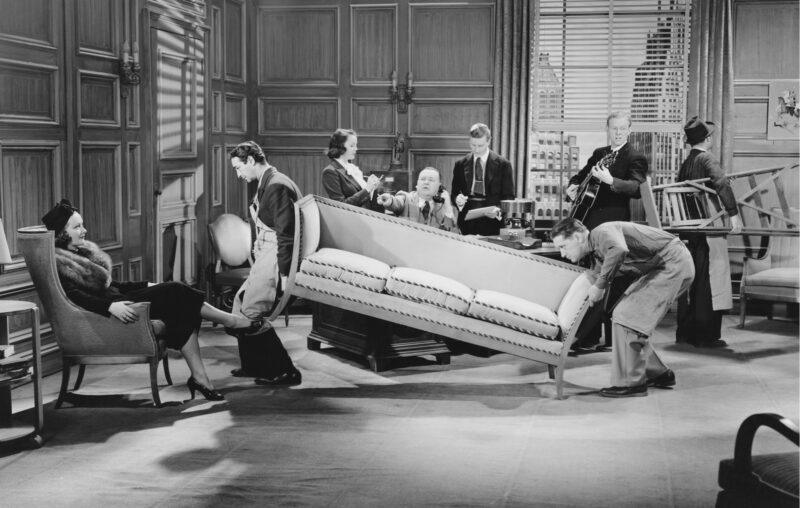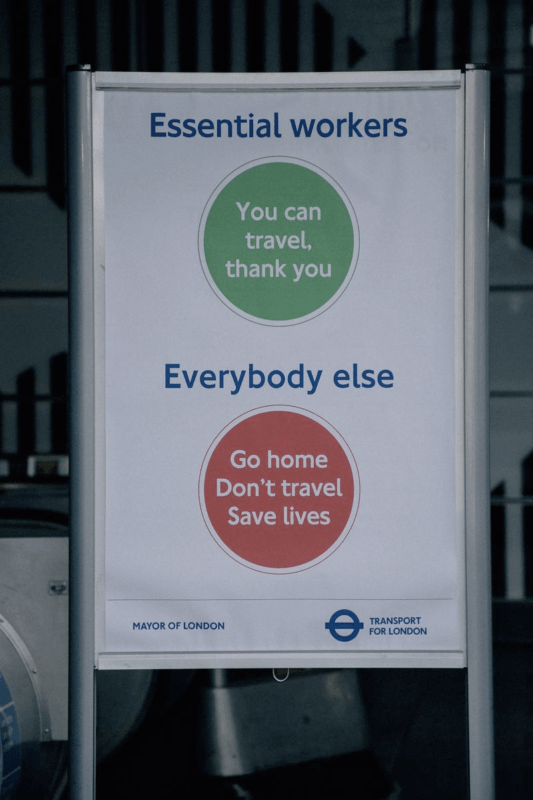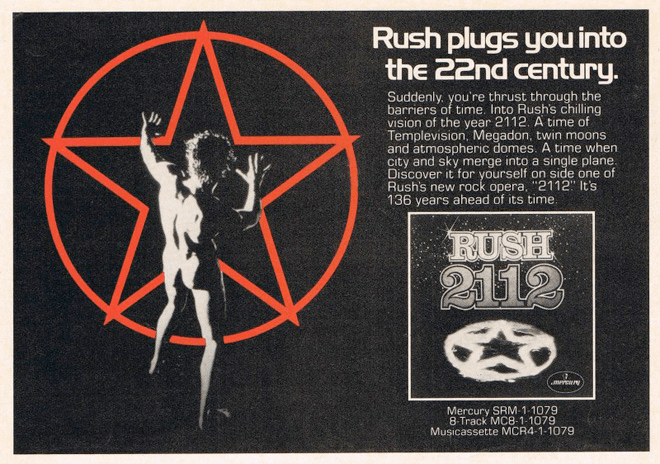Essential and Non-Essential: Never Again

What makes somebody “essential?” Governmental and societal responses to Covid-19 have revolved around classifying certain types of human behavior and individuals themselves as “essential” or “nonessential.” But what is the meaning of this distinction?
Essential to whom? Essential to what end? Who has the ability to discern and decide for all of us what is and what isn’t essential? Is such a descriptor even applicable to individuals and their pursuits? Whatever the definition of this nebulous word, governments and communities across the world have employed the term to create a caste system of worthy and unworthy individuals.

We might define seeing our friends and family members as “essential.” On the other hand, a public health official might simply define “essential” as those activities which are necessary for the members of society to continue maintaining homeostasis, i.e. not dying. To this end, any action that isn’t taken to forward the collective end if survival is not only “nonessential,” but is deemed to be at odds with the greater good and impermissible.
Rush, “2112”, and the Valorization of the Pursuit of Happiness

In 1976, long before the governments’ medieval, illiberal lockdowns, a Canadian rock and roll band released a 20 minute, 33 second ode to musicians, artists, and all pursuers of beauty, self-actualization, and happiness. The song, written by Neil Peart, the primary lyricist and world-renowned drummer of Rush, bears the enigmatic title of “2112.”
Set in that year, the song describes a dystopian future in which society and everyone within it are micromanaged by a council of elders, known as the “Priests of Syrinx.” Sciencemag explains that, “[t]he melodious call of many birds comes from a mysterious organ buried deep within their chests: a one-of-a-kind voice box called a syrinx.” Ironically, and unfortunately for the protagonist of the song, the Priests of Syrinx are decidedly against the making of music.
One of the earliest verses of “2112” is the Priests of Syrinx incanting their collectivist philosophy and emphasizing that its legitimacy is not up for debate: “Work together/Common sons/Never need to wonder/How or why.” It would seem that many Americans have taken the Priests’ words to heart and are acquiescing wholesale to the edicts of governors and public health officials.
In contrast, those public health experts and concerned citizens who do call into question the morality of forced business closures and hard lockdown and social-distancing policies are straw-manned as science-deniers, selfish evil-doers, or both.
Instead, they are encouraged to accept the models devised by the computational simulations of epidemiological experts like Neil Ferguson – never mind that Ferguson’s doomsday predictions were called into question by AIER early on in the pandemic and have since been proven false by reality. Eerily, the Priests of Syrinx also appeal to the supposed infallibility of their “great computers/[that] fill the hallowed halls.”
CNN recently published a disturbing piece unironically entitled, “Even with hope on the horizon in this pandemic, what’s the point of ever leaving home again?” Again, the sentiment that an individual can be content while stripped of his freedom bears a striking similarity to the paternalistic rhetoric of the authoritarian Priests of Syrinx who claim that: “All the gifts of life/Are held within our walls.”
Much like the explicitly stated policy objectives of the Biden administration, the Priests of Syrinx revel in the equity and egalitarianism of their planned society: “Look around this world we made/Equality/Our stock in trade/Come and join the Brotherhood/Of Man.” In both the Biden regime and the society of The Foundation, it is not the pursuit of one’s own happiness which is emphasized, but sacrificing for the country or “the Brotherhood of Man,” respectively.
One’s own life and enjoyment thereof is not deemed as a legitimate justification for one’s own existence; this is “nonessential” and explicitly unethical and vaguely immoral to altruists, egalitarians, and collectivists. What’s “essential,” ethical, and moral is living for one’s neighbor and relentlessly pursuing a Rawlsian policy of doing whatever benefits the worst off the most: the maximin principle.
Later on in the song, the protagonist, a nameless citizen of The Foundation, discovers a “strange device” that the listener quickly identifies as a guitar. The citizen is excited to “share this new wonder” with his compatriots so that “the people will all see its light” and “make their own music,” meaning pursue their own happiness and refine their ability as musicians. Believing in the benevolence of his governmental masters, the citizen ends by singing “The Priests praise my name on this night.” The citizen then presents the Priests the guitar and implores them to,
“Hear what it can do/There’s something here as strong as life/I know that it will reach you.”
To the horror of the protagonist and presumably the listener, the priests admit that they were already aware of its existence and rejected the guitar, music, and individuals’ enjoyment thereof as a meaningless distraction:
“Yes, we know/It’s nothing new/It’s just a waste of time/We have no need for ancient ways/Our world is doing fine/Another toy/That helped destroy/The elder race of man/Forget about your silly whim/It doesn’t fit the plan” (Italics my own)
If this doesn’t call to mind images of government officials and public health officials describing human connection, merrymaking, socializing, partying, family gatherings, sports tournaments, music concerts, etc. as unnecessary, dangerous, and in violation of their plans to “stop the spread,” then feel free to stop reading now. But for those with whom the preceding quote gives an abundance of pause, I implore you to continue.
In an almost explicit reference to Rawls’ Theory of Justice as Fairness, the priests of Syrinx ask the bard how his guitar-playing materially helps those worse off than him:
“Don’t annoy us further/We have our work to do./Just think about the average/What use have they for you?”
This line of question is completely cogent from the perspective of a Rawlsian mini-maxer who believes one cannot morally pursue their own happiness while there are others who need his help. This moral logic has played out since last March and is evidenced by Fauci, state health officials, and various governors declaring family gatherings, socializing, other forms of communal interaction and in-person work as “nonessential.” The obvious question to such a statement, as posited in the beginning of this essay, would and must be, “Nonessential to whom?”
The logical conclusion of this moral philosophy is that virtually every activity that humans engage in is immoral when it isn’t directly related to providing for the subsistence of others or otherwise helping the relatively worse off.
Under such a paradigm, everyone must lead a lifestyle of absolute asceticism and altruism to be considered moral. This is absurd prima facie and only becomes more incoherent the more it is scrutinized; how can living, working, and sacrificing for somebody be meaningful if that person’s own life and enjoyment thereof is not meaningful in and of itself? It cannot.
No, the individual and his pursuit of happiness is the end in and of himself and needs no further justification. A man cannot be “nonessential” because he is essential to himself; the quality of “essential” is not imparted extrinsically from a higher power, but exists inherently within every man who values his life and his enjoyment of it.
The Consequence of Society’s Adoption of the Concept of the Essential Worker
Following the priests’ destruction of his guitar along with their denial of his personal pursuit of beauty, fulfillment, and happiness, the protagonist of “2112” seeks to escape the brutalist reality confronting him by escaping into an altered state of consciousness:
“I wandered home through silent streets/And fell into a fitful sleep/Escape to realms beyond the night/Dream – can’t you show me the light.”
As young Americans struggle to derive happiness from their present circumstances, given the isolation and atomization produced, ironically, by policies designed to promote public health, their mental health has suffered dearly. As reported by FAIRHealth:
“For the age group 13-18, in April 2020, claim lines for generalized anxiety disorder increased 93.6 percent as a percentage of all medical claim lines over April 2019, while major depressive disorder claim lines increased 83.9 percent and adjustment disorder claim lines 89.7 percent.”
Normal coping mechanisms and support systems stolen from young people by government fiat and societal paranoia; many have been forced to stay at home instead of attending school, seeing their friends, partaking in communal activities, and doing all those “nonessential” things that make life worth living. Unsurprisingly, rates of substance abuse and overdoses have increased as young people engage in self-destructive forms of escapism to even temporarily depart the depressing world that they have been thrust into:
“For the age group 13-18, claim lines for overdoses increased 94.91 percent as a percentage of all medical claim lines in March 2020 and 119.31 percent in April 2020 over the same months the year before. Claim lines for substance use disorders also increased as a percentage of all medical claim lines in March (64.64 percent) and April (62.69 percent) 2020 as compared to their corresponding months in 2019.”
Upon having his guitar destroyed along with his sole outlet of happiness and beauty, the protagonist of “2112” kills himself:
“I don’t think I can carry on/This cold and empty life/My spirits are low, in the depths of despair/my lifeblood/Spills over…”
Again, the consequences of isolating people, robbing them of their purpose by government fiat, and stripping them of what makes them happy has resulted in an increase in not just drug abuse, but drug overdose deaths, as reported by the CDC:
“Over 81,000 drug overdose deaths occurred in the United States in the 12 months ending in May 2020, the highest number of overdose deaths ever recorded in a 12-month period, according to recent provisional data from the Centers for Disease Control and Prevention (CDC). While overdose deaths were already increasing in the months preceding the 2019 novel coronavirus disease (COVID-19) pandemic, the latest numbers suggest an acceleration of overdose deaths during the pandemic.“
Data from FAIRHealth reveals that intentional-self-harm among young people has also increased from 2019 to 2020:
”Claim lines for intentional self-harm as a percentage of all medical claim lines in the 13-18 age group increased 90.71 percent in March 2020 compared to March 2019. The increase was even larger when comparing April 2020 to April 2019, nearly doubling (99.83 percent). Comparing August 2019 to August 2020 in the Northeast, for the age group 13-18, there was a 333.93 percent increase in intentional self-harm claim lines as a percentage of all medical claim lines, a rate higher than that in any other region in any month studied for that age group.”
You Are Essential
People’s communities, jobs, hobbies, and everyday lives are essential to their survival and flourishing. It is unethical and immoral for central planners and public health officials to attempt to control the spread of a virus – however deadly it may be to certain demographics – at the expense of individuals’ natural rights, physical health, mental health, and metaphysical well-being: that elusive, invaluable thing called “happiness.”
All people are essential in, of, and for themselves; they need no justification from technocrats, bureaucrats, elected officials, or any other person or collective. The conviction that man’s life need no higher justification than his own happiness was articulated concisely and artfully in Anthem by Ayn Rand, whose “genius” Rush credits on the inside cover of “2112” for its inspiration:
“For I know what happiness is possible to me on earth. And my happiness needs no higher aim to vindicate it. My happiness is not the means to any end. It is the end. It is its own goal. It is its own purpose. Neither am I the means to any end others may wish to accomplish. I am not a tool for their use. I am not a servant of their needs. I am not a bandage for their wounds. I am not a sacrifice on their altars. I am a man. This miracle of me is mine to own and keep, and mine to guard, and mine to use, and mine to kneel before!… I owe nothing to my brothers, nor do I gather debts from them. I ask none to live for me, nor do I live for any others. I covet no man’s soul, nor is my soul theirs to covet.”








